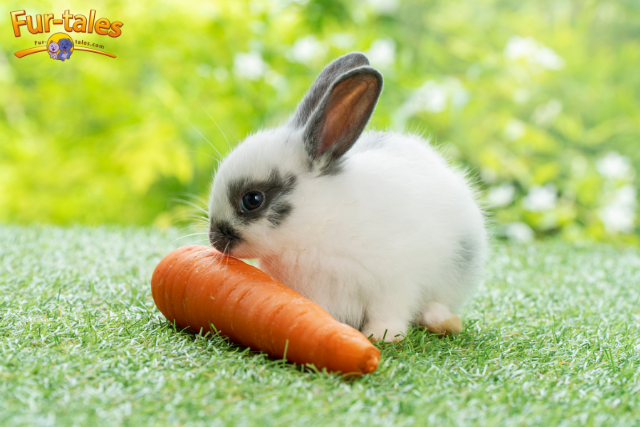
Feeding Your Rabbit the Right Way: Smart Tips and Common Mistakes
Rabbits are adorable, intelligent, and social creatures—but when it comes to their diet, they can also be surprisingly complex. If you’re a new bunny parent or thinking about adding one to your family, understanding the ins and outs of rabbit nutrition is essential for keeping your furry friend healthy and happy.
In this guide, we’ll cover the foundations of proper rabbit nutrition, highlight common feeding mistakes to avoid, and offer smart, practical tips for daily care. Whether you’re preparing for your rabbit’s first vet visit or creating a pet health checklist, this article will help you give your rabbit the best possible start.
The Basics of a Healthy Rabbit Diet
A rabbit’s diet should mimic what they would eat in the wild: high-fiber, low-fat, and full of variety. Here’s what that looks like in your home:
1. Unlimited Hay
Hay is the cornerstone of a healthy rabbit diet. It provides the fiber necessary to keep their digestive system moving and their teeth worn down.
- Best choice: Timothy hay, orchard grass, or meadow hay
- Avoid: Alfalfa hay for adult rabbits (too high in calcium and protein)
Keep hay available at all times. Change it daily to keep it fresh and dry.
2. Fresh Leafy Greens
Offer 1 to 2 cups of fresh vegetables per 5 lbs of body weight daily.
- Top choices: Romaine lettuce, cilantro, parsley, bok choy, basil
- Rotate greens to provide a mix of nutrients
- Introduce new veggies slowly to prevent digestive upset
3. Limited Pellets
Pellets are a good supplement, not the main course.
- Choose high-fiber pellets (at least 18% fiber)
- Limit to 1/4 cup per 5 lbs of body weight per day for adults
Avoid pellet mixes with seeds, corn, or colorful bits—they’re more like junk food than health food.
4. Fresh Water
Always provide clean, fresh water. You can use a bowl or a bottle, but bowls encourage more natural drinking behavior.
Keywords: rabbit feeding guide, best rabbit diet, healthy rabbit food, rabbit care tips
Smart Tips for Feeding Your Rabbit
1. Stick to a Routine
Rabbits love consistency. Feed them at the same times each day and keep their food and water bowls in a familiar spot.
2. Watch for Digestive Changes
If your rabbit’s poop becomes small, irregular, or stops altogether, it’s a red flag. Gut stasis is a serious condition and often linked to poor diet.
3. Introduce New Foods Gradually
Add one new green or veggie at a time and observe for 24 hours. Look for signs of gas, diarrhea, or loss of appetite.
4. Use Treats Sparingly
Stick to natural treats like a small slice of banana, apple (no seeds), or carrot. Even natural sugars can upset their gut if overfed.
5. Keep a Feeding Log
A simple notebook or app can help you track what your rabbit eats and spot patterns in behavior or digestion.
Keywords: daily rabbit routine, rabbit digestive health, safe rabbit treats, new pet owner tips
Common Feeding Mistakes to Avoid
1. Overfeeding Pellets
This is the number one mistake. Pellets are calorie-dense and can lead to obesity and dental issues.
2. Feeding the Wrong Veggies
Avoid iceberg lettuce, beans, potatoes, onions, and rhubarb—these can be harmful or toxic to rabbits.
3. Too Many Treats
Even “healthy” treats like fruit should be limited. Your rabbit’s digestive system isn’t built to handle sugar.
4. Skipping Hay
Hay isn’t optional. Skipping it or replacing it with pellets is a recipe for health problems.
5. Not Monitoring Weight
Weigh your rabbit monthly. Sudden weight gain or loss can be a sign of diet imbalance or illness.
Keywords: rabbit feeding mistakes, avoid rabbit health issues, unhealthy rabbit diet
Frequently Asked Questions (FAQs)
Q: What vegetables are safe for rabbits?
A: Safe veggies include romaine lettuce, parsley, cilantro, kale (in moderation), bok choy, and dill. Avoid iceberg lettuce, onions, and potatoes.
Q: How much should I feed my rabbit each day?
A: Adult rabbits should have unlimited hay, 1-2 cups of greens per 5 lbs body weight, and 1/4 cup of pellets per 5 lbs body weight. Treats should be given sparingly.
Q: Can rabbits eat fruit?
A: Yes, but in very small amounts. Good options include banana slices, apple (without seeds), or berries. Limit to 1-2 teaspoons per day.
Q: Is alfalfa hay okay for rabbits?
A: Alfalfa hay is best for young or underweight rabbits due to its high calcium and protein. Avoid it for healthy adults.
Q: What signs show that my rabbit has digestive issues?
A: Look for changes in poop size or consistency, lack of appetite, hunched posture, or reduced activity. These could indicate gut stasis or another health issue.
Image Designed Using Canva
